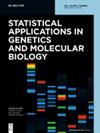EBADIMEX:一种检测联合差异表达和甲基化并对样本进行分类的经验贝叶斯方法
IF 0.9
4区 数学
Q3 Mathematics
引用次数: 0
摘要
摘要DNA甲基化和基因表达是相互依赖的,两者都与癌症的发展和进展有关,发现了许多单独的生物标志物。对这两种数据类型的联合分析可能会产生单独分析无法发现的生物学见解。为了最佳地利用联合数据来识别扰动基因和对临床癌症样本进行分类,准确地对两种数据类型之间的相互作用进行建模是很重要的。在这里,我们介绍了EBADIMEX,用于联合鉴定差异表达和甲基化,并对样本进行分类。在当前的差分表达方法中,与经验贝叶斯先验一起广泛使用的有调节t检验通过发展被推广到多变量设置:(1)方差不等的均值相等的有调节Welch t检验;(2) 方差相等的调节F检验;以及(3)方差相等的均值相等的多变量检验。这导致了具有参数先验分布的参数模型,这允许对小数据集进行快速评估和稳健分析。EBADIMEX在模拟数据以及TCGA的大型癌症(BRCA)队列中得到了证明。我们表明,使用经验贝叶斯先验和调节测试在小数据集上效果特别好。本文章由计算机程序翻译,如有差异,请以英文原文为准。
EBADIMEX: an empirical Bayes approach to detect joint differential expression and methylation and to classify samples
Abstract DNA methylation and gene expression are interdependent and both implicated in cancer development and progression, with many individual biomarkers discovered. A joint analysis of the two data types can potentially lead to biological insights that are not discoverable with separate analyses. To optimally leverage the joint data for identifying perturbed genes and classifying clinical cancer samples, it is important to accurately model the interactions between the two data types. Here, we present EBADIMEX for jointly identifying differential expression and methylation and classifying samples. The moderated t-test widely used with empirical Bayes priors in current differential expression methods is generalised to a multivariate setting by developing: (1) a moderated Welch t-test for equality of means with unequal variances; (2) a moderated F-test for equality of variances; and (3) a multivariate test for equality of means with equal variances. This leads to parametric models with prior distributions for the parameters, which allow fast evaluation and robust analysis of small data sets. EBADIMEX is demonstrated on simulated data as well as a large breast cancer (BRCA) cohort from TCGA. We show that the use of empirical Bayes priors and moderated tests works particularly well on small data sets.
求助全文
通过发布文献求助,成功后即可免费获取论文全文。
去求助
来源期刊
CiteScore
1.20
自引率
11.10%
发文量
8
审稿时长
6-12 weeks
期刊介绍:
Statistical Applications in Genetics and Molecular Biology seeks to publish significant research on the application of statistical ideas to problems arising from computational biology. The focus of the papers should be on the relevant statistical issues but should contain a succinct description of the relevant biological problem being considered. The range of topics is wide and will include topics such as linkage mapping, association studies, gene finding and sequence alignment, protein structure prediction, design and analysis of microarray data, molecular evolution and phylogenetic trees, DNA topology, and data base search strategies. Both original research and review articles will be warmly received.

 求助内容:
求助内容: 应助结果提醒方式:
应助结果提醒方式:


